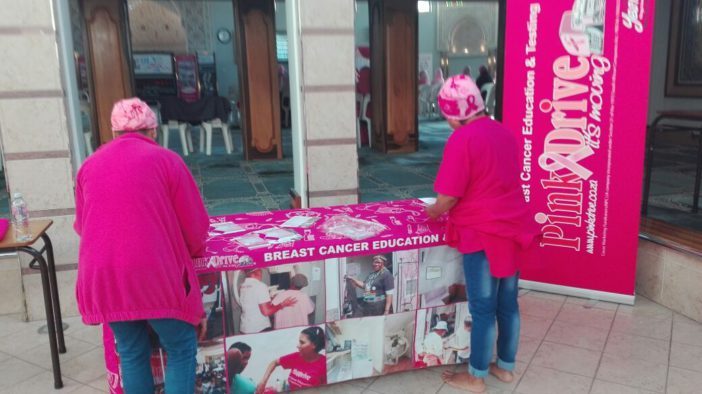For many, the month of October signals the nearing of the festive season, but for cancer patients the month has become a tribute to the struggles that accompanies the far-reaching disease. According to CANSA, 14 million people are diagnosed with cancer annually and an alarming one in four South Africans is affected by cancer through either a family or friends diagnosis. The main cancer that impacts South African women is breast cancer, where one in nine women is at risk.
As part of the broader focus on breast cancer during this month, VOC hosted its annual Pink Hijab Day at Masjid al-Quds on Tuesday, where it witnessed hundreds of women stand in solidarity with those who have been impacted by the disease. Filling the masjid with bright white and pink hues, cancer patients, survivors, carers and family and friends of patients spoke of their experience and supported the call for increased awareness about the disease.
Surprisingly, many attendees anxiously chose to be screened for breast cancer, which was provided free of charge by Pink Drive, Cancer Association of South Africa (CANSA) and the Islamic Medical Association (IMA).
Speaking to VOC at the event, Razina Jakoet said while she has not personally been diagnosed with cancer, she experienced the impact of the disease when her sister was diagnosed with breast cancer. She attended the event in the spirit of solidarity with both survivors and those currently undergoing treatment.
Given her family history, Jakoet was encouraged by her medical practitioner to undergo a mammogram scan to detect breast cancer, but due to her anxiety continued to delay being tested.
She chose VOC’s Pink Hijab Day to finally lay her fears to rest and confront which ever reality she is faced with.
“I’m actually not scared, it needs to be done, and I need to know [the outcome],” she stated.
As someone who has witnessed the suffering that cancer and its accompanying treatments impose on patients, Jakoet asserts that the main facet of assistance that family and friends can offer patients are an abundance of love and support.”
“There are so many emotions, I remember when my sister was diagnosed, I was the one to cry and she was the strong one. [So] be kind, they need to be handled with care and lots of love and [remember] some people don’t want to be fussed about.”
Sadly, Jakoet’s sister passed away three years ago at the age of 33.
Also awaiting screening, wife and daughter of deceased cancer patients, Maymouna Samodien-Abrahams, anxiously awaited her turn to hear her diagnosis.
Samodien-Abrahams lost her husband six years ago after losing the battle against lung cancer, this after 36 years of marriage.
“Yes, [the family] has gone through a lot, but I believe that Allah forgives you for every pain that one experiences,” she said.
Describing her emotions while standing in the queue as being “very calm”, she says that she only hopes that her screening is negative.
Given the fact that at least four women were positively screened for lumps at the event, Samodien-Abrahams encouraged everyone to be proactive and screen themselves for cancer as soon as possible.
“There is enough awareness, it is just for you to go and seek the help.”
Kashiefa Trout, the sister of a cervical cancer patient, says that in meeting numerous patients at cancer treatment centres she quickly learnt about the dangers of prolonging screening.
“I met this woman who said that she never knew she had breast cancer, but that she always had this pain in her back, which doctors diagnosed as arthritis – in the end, it was breast cancer,” Trout noted.
Given the taboo nature of the topic of cancer, she urges communities to break the silence on the disease and further asserts that cancer is not a “death sentence.”
“There is help at the hospitals and if you don’t have taxi fare then doctors help you and there is a grant. The grant is your right so that you can come to hospital for treatment – there is a lot of support out there.”
Trout says that Pink Hijab Day provides individuals with a platform to interact with cancer patients and to learn about the disease.
Describing her emotions as “good” following her screening, Trout was advised to visit Groote Schuur Hospital to undergo a mammogram to verify her negative cancer status. VOC






 WhatsApp us
WhatsApp us 

